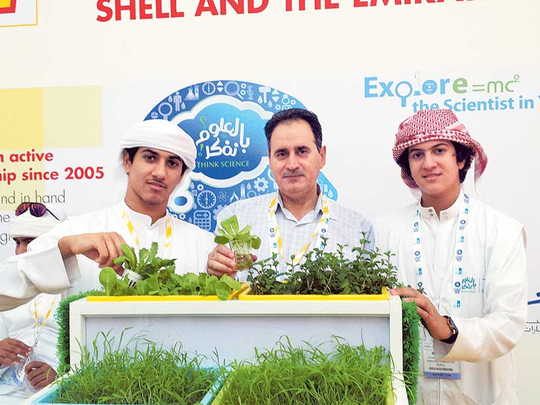
Abu Dhabi: Planting seeds without using soil, and producing electricity while exercising, were just some of the highly innovative projects to have been displayed by young Emirati school students during the past week’s Abu Dhabi International Petroleum Exhibition and Conference (Adipec).
The students were all part of the Emirates Foundation’s Think Science stand, allowing visitors and investors to get a good insight into some of the forward-thinking ideas young Emiratis are working on.
Saif Al Shebli, who studies at Khalifa Bin Zayed School, Al Ain, helped come up with the idea behind soilless cultivation, a planting method that can drastically reduce the amount of water consumption that is needed to grow plants.
“The idea behind our project is to plant seeds without using any soil. The way we do this is by having a sponge, and a material known as perlite which is a small piece of volcanic glass,” he explained to Gulf News.
“The sponge and perlite act as the water retainers, so the water that you use for the seeds does not evaporate and waste, and this means we don’t have to keep using water everyday,” he added.
Another element that’s used is the seaweed extract, which also does away with the need to use chemicals and pesticides to help the plant grow.
“Seaweed extract holds important nutrients for the plant to grow,” Al Shebli said. “It’s all very simple, the person gets the sponge with the perlite, places the seeds, and mixes the water with the seaweed extract and the plant will grow,” he added.
Implementing this idea according to Al Shebli will have major benefits to the UAE with regards to its water security. “In the UAE, we do not have a lot of fresh water supplies, so proper water use is very important for our country. Thanks to our project, we will no longer have to consume so much water when it comes to planting, so we end up saving not only water but money as well,” he said.
Meanwhile, Mohammad Al Dhanhani, who studies at The Glenelg School of Abu Dhabi, has developed a project that sees electricity being produced through people exercising on a bicycle.
“In general, when a person exercises, the body produces energy, so I thought it would be good to save and transform this energy into electricity, rather than just letting it go to waste,” he said.
“When the person begins peddling they produce kinetic energy which is an energy of motion, this energy and movement is connected to the generator, and the generator is connected to a battery where the electricity is then saved,” he added.
The saved electricity can then be used to power several home appliances according to Al Dhanhani. “In many gyms you find so many cycles ... so they could even power their own lights,” he said.
“All that’s required is a generator, a battery, and a converter,” he added.
Al Dhanhani told Gulf News the motivation behind the idea came from what he learned in school, and an urge to help his country.
“We studied physics in school on how to transform energies into electricity, so I decided to put that knowledge into use with something beneficial. The UAE and the entire world is searching for unconventional ways of using energy, and this is one method,” he said.
“We will save a lot of money and energy by doing something as simple as this.”












